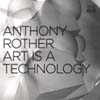 |
ANTHONY
ROTHER
ART IS A TECHNOLOGY
ALBUM STAHL INDUSTRIES RELEASE:
MARCH 2005 REVIEW: MARCH
19, 2005
 |
Anthony
Rother is an individual
who certainly cannot
ever be accused of complacency.
The man's prolific nature
in the electro scene
is, without question,
admirable. He is best
known for his more up
tempo releases, namely
the classics"Sex
with the Machines", "Simulationszeitalter" and "Hacker".
In addition to the work
he releases under his own
name, there are a slew
of side-projects which
he also has: Family Lounge,
Psi Performer, the Nezzwerk
12" series,
Little Computer People
(which featured Mr. Karl
Bartos as a participant),
Studio and God of the
Gods, to name a few.
Last year brought the
release of "Popkiller",
a bland, boring and rather
banal waste which was
a blot on his otherwise
amazing catalogue. I
was quite shocked and
more than a little worried
by this nasty turn of
events.
2005 sees the continuation
of another side of Mr.
Rother; the side less
visible to the public,
and certainly not the one
which will ever be heard
in any club. "Art
Is a Technology" is
a continuation, and perhaps
the completion of a trilogy
which began back in 2003
with the stunning pair
of albums "Elixir
of Life" and "Magic
Diner".
These works showed a darker,
more introspective, cinematic
approach. The titles for "Art
Is a Technology" are
simply catalogued as parts
1-15. This album contains
no vocals whatsoever but
rather the mechanized
sounds of the machines
he makes do his bidding.
There are also no beats
to be found on "Art
Is a Technology" but
if you are a fan of seamless
electronic music which
is aimed at the head rather
than the feet, you will
devour Rother's latest
foray into what I would
describe as music for
the small hours (between
1 and 5am) when the world
is a starkly deserted
place. The halogen street
lights hum as their cold
light radiates off of
the asphalt; the city
streets are deserted and
silent, only the thoughts
can be heard. Coil fans,
take note.
I really get a feeling that this is the sort of music which he likes doing
best as it requires far more effort to produce, and takes a more concerted
effort to get into. Understandably, there are going to be a lot of people
who will mistakenly view this new album as somewhat simplistic, but then,
the subconscious is not always easily accessible to the club crowd. Those
who prefer big beats and strobe lights to the subtle, psychoactive tapestries
of sound which this man conjures on releases like this had best stay away.
PETER
MARKS
|
|
|